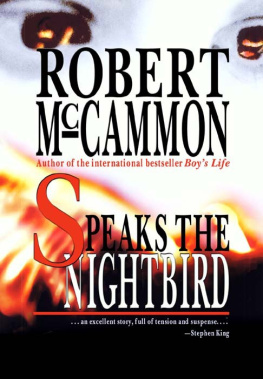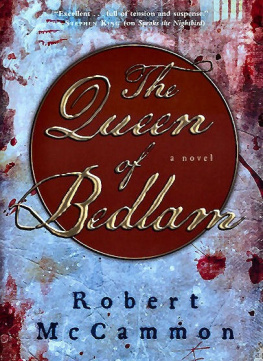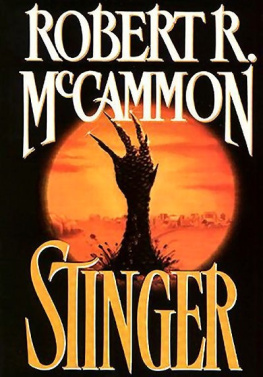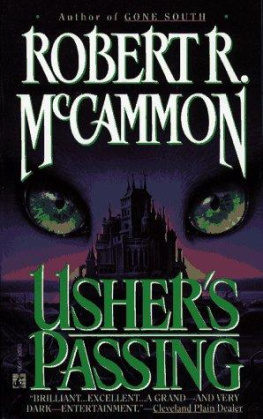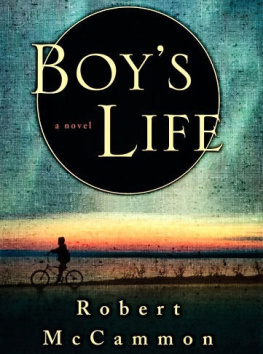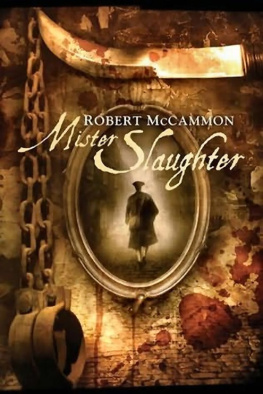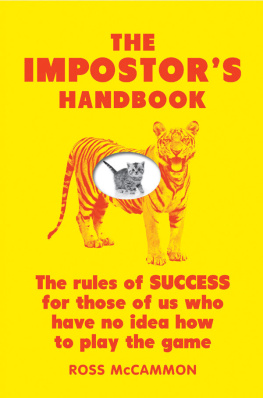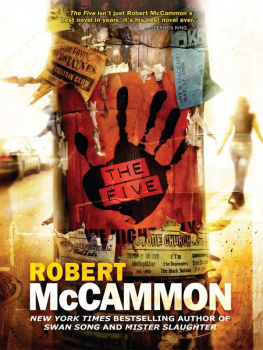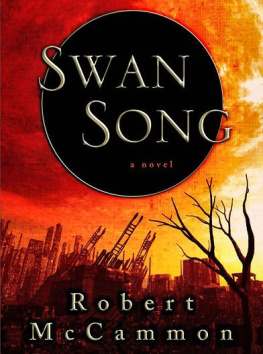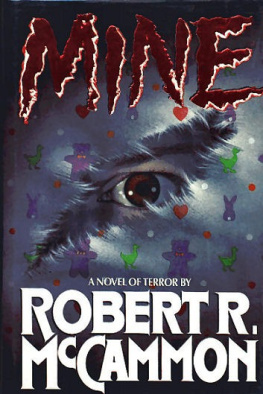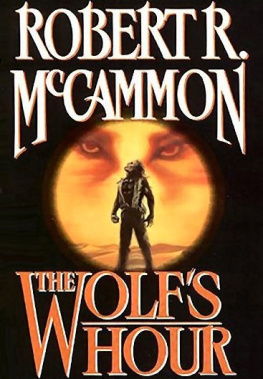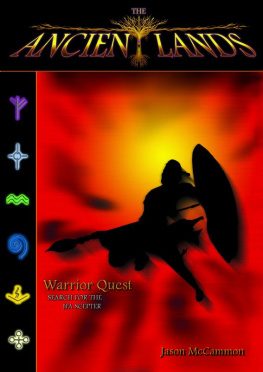Robert McCammon - Speaks the Nightbird
Here you can read online Robert McCammon - Speaks the Nightbird full text of the book (entire story) in english for free. Download pdf and epub, get meaning, cover and reviews about this ebook. year: 2007, publisher: Simon & Schuster, genre: Detective and thriller. Description of the work, (preface) as well as reviews are available. Best literature library LitArk.com created for fans of good reading and offers a wide selection of genres:
Romance novel
Science fiction
Adventure
Detective
Science
History
Home and family
Prose
Art
Politics
Computer
Non-fiction
Religion
Business
Children
Humor
Choose a favorite category and find really read worthwhile books. Enjoy immersion in the world of imagination, feel the emotions of the characters or learn something new for yourself, make an fascinating discovery.
- Book:Speaks the Nightbird
- Author:
- Publisher:Simon & Schuster
- Genre:
- Year:2007
- Rating:4 / 5
- Favourites:Add to favourites
- Your mark:
- 80
- 1
- 2
- 3
- 4
- 5
Speaks the Nightbird: summary, description and annotation
We offer to read an annotation, description, summary or preface (depends on what the author of the book "Speaks the Nightbird" wrote himself). If you haven't found the necessary information about the book — write in the comments, we will try to find it.
Speaks the Nightbird — read online for free the complete book (whole text) full work
Below is the text of the book, divided by pages. System saving the place of the last page read, allows you to conveniently read the book "Speaks the Nightbird" online for free, without having to search again every time where you left off. Put a bookmark, and you can go to the page where you finished reading at any time.
Font size:
Interval:
Bookmark:
Speaks the Nightbird
By
Robert McCammon
-Contents-
Came the time when the two travelers knew night would catch them, and shelter must be found. It had been a joyful day for frogs and mudhens. For the human breed, however, the low gray clouds and chill rain coiled chains around the soul. By the calendar the month of May should by all rights and predictions be charitable if not merry, but this May had entered like a grim-lipped miser pinching out candles in church.
Waterfalls streamed through the thick branches that interlocked forty feet above the road. The leaves of ancient oaks and elms, and the needles of the lofty pines, were more ebon than green, the huge trunks bearded with moss and blotched by brown lumps of fungus the size of a blacksmith's fist. To say that there was a road beneath those branches would be taking liberties with language: it was a canchre-colored mudhole emerging from the mist and disappearing into the mist.
"Steady, steady," said the wagon's driver to the pair of laboring nags as they pulled southward, breath steaming and skinny flanks trembling against the weight of wooden wheels through slop. He had a small stinger of a whip close at hand, but he declined to use it. The horses, which along with the wagon had been afforded him from the municipal stable of Charles Town, were doing all they could. Beneath the wagon's soaked brown burlap canopy, and behind the raw pinewood plank that occasionally fired splinters into the travelers rear ends, were two unmatched trunks, a valise, and a wig box, all four pieces of luggage bearing scars and gouges that betrayed lives of undignified shipment.
Thunder rumbled overhead. The horses struggled to lift their hooves in the muck. "Get up, there," the driver said, with not a smudge of enthusiasm. He gave the reins a half-hearted flick, his hands protected by a pair of gray cloth gloves, then he sat without further comment as raindrops fell from the furled edges of his black, mud-spattered tricorn hat and added more soggy bulk to his raven's-hue fearnaught coat.
"Shall I take them, sir?"
The driver glanced at his fellow sufferer, who was offering to hold the reins. By no idylls of the imagination could the two be called bookends; the driver was fifty-five years of age, the passenger fresh of twenty. The older man was big-boned and had a heavy-jowled and ruddy face, with thick and bristling gray eyebrows set like ramparts over deeply cast ice-blue eyes that were as congenial as newly primed cannon barrels. His nose-as a polite Englishman might say-was well-dimensioned. A forthright Dutchman might say its owner had bloodhound in his lineage. The driver's chin was also a sturdy piece of sculpture, a square bulwark scored with a cleft that could have sheltered a small musket ball. Usually his face was scraped clean by scrupulous passes of the razor, but today the salt-and-pepper beard was making an appearance.
"Yes," he said. "Thank you." He passed the reins over, one of the many times they'd exchanged this duty in the past hours, and worked some feeling back into his fingers.
The younger man's lean, long-jawed face had courted more candle glow than sunlight. He was thin but not frail, rather sinewy like a tough garden vine. He wore square-toed shoes, white stockings, olive-green breeches, and a short, tight-fitting brown jacket made of cheap kerseymere over a plain white linen shirt. The knees of his breeches and the elbows of his jacket had been patched at least as often as the older man's clothing. On his head was a dun-colored woolen cap, pulled down over finely textured black hair that had recently been cropped close to the scalp to combat an infestation of lice in Charles Town. Everything about the younger man-nose, chin, cheekbones, elbows, knees-conveyed the impression of sharp angles. His eyes were gray, flecked with dark blue, the colors of smoke at twilight. He did not urge on the horses nor spank them with the reins; he only intended to guide. He was if anything a stoic. He understood the value of stoicism, for already in his life he'd endured such trials as might break someone who did not.
As he worked his hands, the older man mused that if he saw fifty-six after this ordeal then he should put aside his vocation and become a Samaritan in thanks to God. He was not cut from the crude frontier cloth. He considered himself a man of taste and refinement, an urban denizen ill-suited to pierce this wilderness. He appreciated clean brickwork and painted fences, the pleasing symmetry of manicured hedges, and the solid regularity of the lamplighter's rounds. He was a civilized man. Rain was down his neck and in his boots, the light was fading, and he had but a single rusty saber in the wagon with which to protect their belongings and their scalps. The village of Fount Royal lay at the end of this mudtrack, but that was cold comfort. His task at that place would not be a gentle one.
But now a touch of mercy! The rain was tapering off, the sound of thunder more distant than before. The older man thought that the worst of the storm must be moving over the ocean, which they'd glimpsed as a frothy gray plain through brief breaks in the forest. Still, a nasty drizzle continued to sting their faces. The hanging folds of mist had curtained the treelimbs, giving the forest a phantasmagoric pall. The wind had stilled, the air thick with a swampy green smell.
"Carolina spring," the older man muttered, his husky voice carrying the melodic accent of well-bred English generations. "There'll be many new flowers in the graveyard come summer."
The younger man didn't answer, but inwardly he was thinking that they might perish on this road, that a stroke of evil could befall them and they'd vanish from the face of the earth just as Magistrate Kingsbury had vanished on this same journey not two weeks ago. The fact that wild Indians haunted these woods, along with all manner of savage animals, was not lost on his imagination. Even with its lice and plague deaths, Charles Town looked like paradise compared to this dripping green hell. The settlers of Fount Royal must be insane to stake their lives and fortunes on such a territory, he'd decided.
But what now was Charles Town had itself been wilderness twenty years ago. Now it was a city and a thriving port, so who could say what Fount Royal might become? Still, he knew that for every Charles Town there were dozens of other settlements that had been devoured by misfortunes. Such too might be the eventual fate of Fount Royal, but at present it was the physical reality of someone's hard-worked dream, and the problem there must be tended to like any problem of a civilized society. But the question remained: why had Magistrate Kingsbury, en route from Charles Town to Fount Royal on this same-and only-road, never reached his destination? The older man had supplied a number of answers to the younger's inquiry-that Kingsbury had run afoul of Indians or highwaymen, that his wagon had broken down and he'd been set upon by beasts. But though the older man had the nose resembling a bloodhound's, it was the younger man who had the bloodhound's instinct. Any lingering scent of a question was strong enough to keep him pondering in pale candle glow long after the older man had retired and was snoring in his bedchamber.
"What's that?"
A gray-gloved finger pointed toward the mist ahead. In a moment the younger man saw what his companion had spied: the pitch of a roof off to the right side of the road. It was the same dark green and wet black as the woods, and might be as ruined a place as the trading post at which they'd expected to rest the horses and break bread in early afternoon, but instead had found only charred timbers and collapse. But there on the roof before them was a pretty sight: a stone chimney flying a flag of white smoke. The mist moved, and the rough-hewn lines of a log cabin took shape.
Next pageFont size:
Interval:
Bookmark:
Similar books «Speaks the Nightbird»
Look at similar books to Speaks the Nightbird. We have selected literature similar in name and meaning in the hope of providing readers with more options to find new, interesting, not yet read works.
Discussion, reviews of the book Speaks the Nightbird and just readers' own opinions. Leave your comments, write what you think about the work, its meaning or the main characters. Specify what exactly you liked and what you didn't like, and why you think so.

